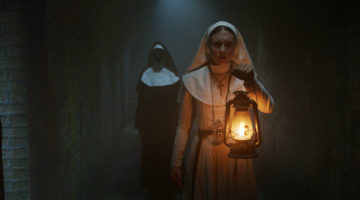Review: Ballet 422
Those looking for high theatricality from the performing arts documentary Ballet 422 (opening at The Bloor Hot Docs Cinema this Friday) will be sorely disappointed, but those looking for a more restrained, but still accurate depiction of backstage life will find enough to enjoy.
Filmmaker Jody Lee Lipes (co-director of the wonderful 2009 dance film NY Export: Opus Jazz and the cinematographer for Tiny Furniture, Martha Marcy May Marlene, and Judd Apatow’s upcoming Trainwreck) takes a look at the two month gestation process of a show for the New York City Ballet. The choreographer for the company’s 422nd show is 25 year old Justin Peck, who’s actually a member of the lowest level of dancers in the company (Corps de Ballet), but who has been given the chance to work with the best levels of talent at their disposal.
Lipes stays as far out of everyone’s way as possible, moving only between the impressionistic – particularly during the film’s sparse set-up – and the procedural. He’s not skewing anything or adding things that wouldn’t have naturally occurred, which can be both a boon and a hindrance to the film. It would have been nice to delve a bit more into the meaning and passion behind the actual story of Peck’s Paz de la Jolla instead of strictly on the nuts and bolts of how the NYCB operates. It makes the show itself – and almost all of the people performing in it and working backstage – into moveable pawns in an art work instead of showing anything from a humanist perspective.
The intricate moving parts of the show’s production will appeal to those well versed in theatre and film. There’s talk of fixing lighting cues, costumers who sometimes have little clue how dancers can move in their outfits, and a moment where the orchestra seems unmotivated, but even these moments of “drama” are settled with rational, kind worded conversations. No one ever raises their voice or flips out. These are professionals acting like adults who only let their egos carry themselves just far enough to not interfere with the entirety of the production. It’s refreshing, especially considering the second half of the film compromises the crunch time of the final week of rehearsals, which one might expect to be chaotic and histrionic.
The only real drama comes from the simple act of watching Peck. He’s visibly stressed, and quite possibly feeling like he’s in over his head. The film looks to match Peck’s calm under pressure demeanour, but it still captures telling moments where the young dancer doesn’t know what to tell his dancers (sometimes resignedly sighing “I don’t know” or “forget it”) and moments akin to a quiet panic as he works on his show from home. There’s something about Peck’s tone and mannerisms that make him fascinating to follow. He’s focused, but there’s a distinct fear there that he might be overstepping something.
Again, Lipes doesn’t make those internal and external struggles obvious because he never addresses his subjects to ask them for their thoughts. Peck and company do their job. Lipes does his. Everything works out just fine.
[star v=3]





